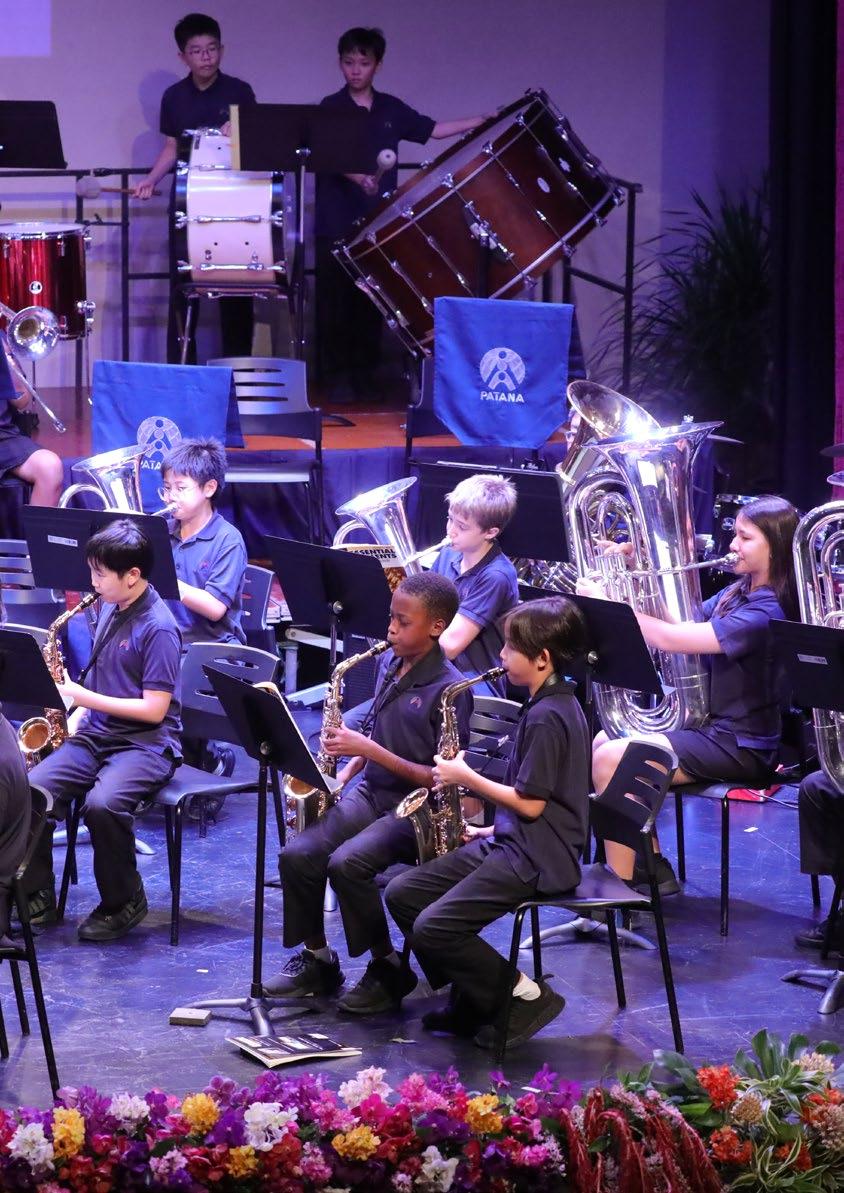




Our mission is to ensure that all students of different nationalities grow to their full potential as independent learners in a caring British International community.
We develop global citizens who shape their world through independence, empathy, creativity and critical thinking
Music Coordinator and Choir Director Ms Laura MacRitchie lama@patana.ac.th
String Ensemble Director Ms Rosanna Brown robw@patana.ac.th
Concert Band Director Mr David Larking dala@patana.ac.th
Guitar Ensemble Director Khun Nanan Indra-Payoong nain@patana.ac.th
Thai Ensemble Director Khun Chodok Kittitornkul chki@patana.ac.th
Clarinet Tutor
Flute Tutor
Saxophone Tutor
Khun Wallop Jearasatit waje@patana.ac.th
Khun Vichit Teerawongwiwat vite@patana.ac.th
Khun Nirat Bonnyasawet nibo@patana.ac.th
Strings Tutor Khun Nithid Banjerdthaworn nibn@patana.ac.th
Percussion Tutor
Choir Assistant
Khun Dontra Kunkhetpai doku@patana.ac.th
Krit Kosoltrakul krko@patana.ac.th
PLEASE NOTE: The content of this booklet was accurate at the time of publication (April 2019).
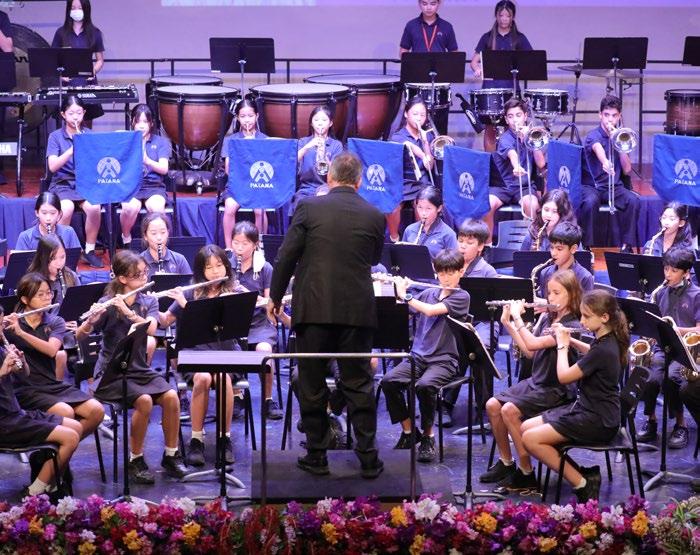
Introduction
Bangkok Patana Secondary School is pleased to be able to offer an integrated performance-based programme in Years 7, 8 and 9. We offer ensemble experiences in Concert Band, String Ensemble, Thai Instrument Group, Vocal Ensemble and Classical Guitar Ensemble. The programme begins with the fundamentals and then goes on to build skills in reading, performance and ensemble playing or singing.
Learning to play an instrument and belonging to a school ensemble opens up a whole new world of friendship groups, fun and performance opportunities. It has a proven positive effect on academic success at all levels. In addition, through the study of music, students improve in self-discipline, group cooperation, problem solving, goal setting, self-expression, memory skills, concentration, poise, physical coordination and self esteem, skills in great demand in almost every aspect of life.
The programme provides students with a strong grounding in performance and this prepares them for further study, whether it be continuing lessons on an instrument or voice, joining one of our school ECA ensembles, recreational playing, IGCSE or IB Diploma Music courses in later years.
The course aims to provide students with an exciting and enjoyable experience through one of the ensemble options available.
• Students will be able to develop technical competence on their selected instrument, skills in reading and ensemble playing
• Students will be playing or singing at an intermediate level by the end of Year 9
• The strong performance base laid in Years 7 to 9 will have a positive effect on the growth and variety of Music Ensembles at the school
• The programme will allow students to access music courses at IGCSE and IBDP level
The Five Ensembles
Ensemble Instruments
Concert Band Trumpet, Trombone, Baritone Horn, French Horn, Tuba, Flute, Oboe, Clarinet, Alto Saxophone, Tenor Saxophone, Percussion (snare drum, bass drum, glockenspiel, etc.)
String Ensemble Violin, Viola, Cello, Double Bass
Vocal Ensemble Male and Female Voice
Guitar Ensemble Classical Guitar
Thai Ensemble Ranard (Thai xylophone), Khim, Sor Oo, Sor Duang, Gong Wong
Students already singing or learning a Concert Band, String Ensemble or Thai Ensemble instrument are encouraged to continue the same instrument in the Key Stage 3 programme. Numbers in the Guitar Ensemble are limited to those students who have prior training on classical guitar.
Piano, Keyboard, Recorder, Drum Kit and Electric Guitar are among the instruments not presently included in this Ensemble Programme, for a variety of reasons. For example, Piano tends to be an individual rather than an ensemble instrument, taught privately one-to-one; Drum Kit again poses logistical problems in the group teaching situation.
Tutors
A team comprising both classroom music teachers and instrumental music teachers carry out the tuition. Please see the contact list on the inside front cover for details.
In order to ensure individual suitability as well as optimal ensemble balance, students will be assisted in their choice of instrument. Choosing carefully in the initial phase of the programme will make a significant impact on future success and enjoyment.
Staffing and other logistical constraints may mean that students may not always receive their first option, so we ask students to put the four ensembles in order of preference. Where possible, the School will help guide students in making this choice.
Initially, students will be asked to select an ensemble category, i.e. String, Concert Band, Thai, Vocal or Guitar. There will then be a process which will involve evaluations by instrumental music specialists. With this assessment information, we will be able to allocate each student a suitable instrument.
Students will be notified of their ensemble placement at the end of Year 6. In the first few weeks of Year 7, students will be allocated a specific instrument within the ensemble.
During this entire process, parents and students with questions or concerns are welcome to contact Ms MacRitchie, Coordinator of Music, via e-mail at lama@ patana.ac.th.
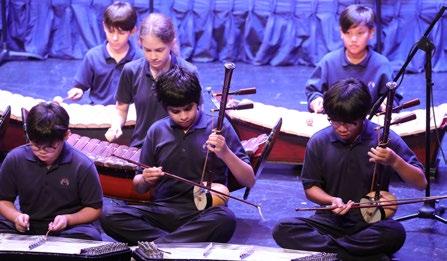
New students who join the school later in the school year may need to be allocated to a performing group based on availability of instruments and the numbers in the ensembles. This may not always be the student’s first choice.
Unless they already own an instrument, students will be supplied with school instruments. These are used in class and then taken home to practice. It is the student’s and parent’s responsibility to ensure that the instruments are safe and secure at all times. When problems do occur, students should notify their teachers immediately so that necessary repairs can be organised.
At school, students are to store their instruments in the lockers provided by the Music Department on the day that they have their music lesson. At the end of the music lesson, instruments should be taken home for practice.
Ranard, Tuba and Double Bass students may keep their instruments at home and play on a school instrument in school.
Some students may possess their own instrument, in which case the school will provide a locker for safekeeping while the instrument is in school.
We charge a termly rental fee of 650 Baht to cover routine repairs, replacement reeds, strings and so on. This is charged to the termly activities account through the School Office. This fee is not charged to those who use their own instrument.
Concert Band, String Ensemble and Classical guitar students use a published ensemble method text, which they will need to purchase at the school shop. This text remains the property of the student and will need to be brought to each session.
Students meet for 80-minutes each week during the normal school day. Four tutor groups are timetabled together for these 80-minutes. The lessons are in the Arts Centre music rooms.
When students leave during the academic year they will be expected to return their instrument to the Secondary School Music Department in good working order.
Students’ progress is regularly monitored and conveyed to parents in the form of termly progress reports and grades.
Students will be expected to practise the skills learnt at school, so that they progress individually and also so that the ensemble develops at a healthy rate of progress. This is to be viewed as homework for music. Initially, a minimum of 30 minutes a week needs to be completed, as in other school subjects. After the first few weeks the expectation will be for four or five times a week for 15-20 minutes at a time. This need not be a burden or a chore, as it is different from work in other subject areas, making a nice change.
Practice involves going over what has been learned in class, trying to improve the sound produced and the accurate reading and rendition of the music. It also involves developing a self-critical faculty, so that if a particular area needs attention, e.g. a particular technical problem or a particularly difficult bar, the student spends a little time practising and improving just that area. Interest, enthusiasm and commitment to regular practice are important.
Parents can help in advising good times to set aside for music practice and in giving positive praise and encouragement. Music achievement requires effort over a period of time, with often the improvement being incremental and quite slow. The time at school in the ensemble class is limited, so regular practice is absolutely essential for any real progress. With strong parental support, playing music will become a natural part of your child’s life.
Parents can help at home by:
Providing a quiet place in which to practise
Remaining nearby sometimes, to see and hear what your child is doing
Helping to schedule consistent times for practice, daily or almost daily
Praising your child’s efforts, improvements and achievements
Encouraging your child when he or she finds it difficult
Encouraging your child to talk about the ensemble classes
Exposing your child to a wide variety of music, including live concerts
Encouraging your child to see the importance of Music studies
Encouraging your child to play for family and friends
Not allowing other people to use your child’s instrument unless they have the permission of your child’s teacher.
Making sure your child’s instrument is well maintained
Similarly, try to avoid:
Using practice as punishment
Insisting your child play for others when they really do not want to play
Making fun of mistakes or less-than-perfect playing
Apologising to others for your child’s weak performance
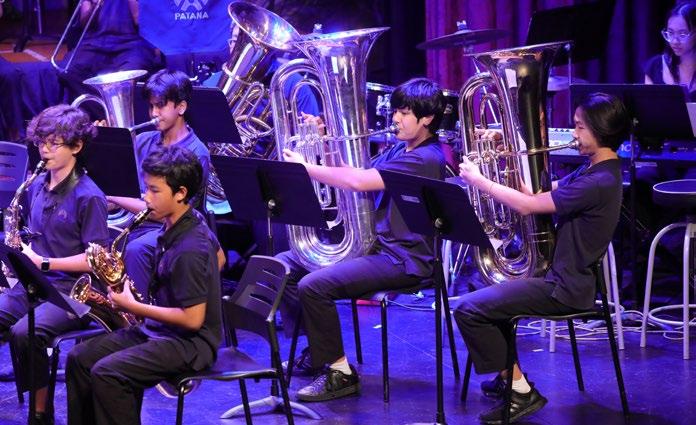
To maintain your child’s interest:
Talk to your child if his or her interest begins to decline
Discuss with the teacher ways to maintain your child’s enthusiasm. This may be done by letter or note, e-mail, telephone conversation or personal appointment. You may speak to the individual instrumental teacher, the Ensemble Director or the general co-ordinator, Ms Laura MacRitchie.
Increase your enthusiasm and involvement in your child’s playing
The individual lesson Instrumental Programme exists alongside the Key Stage 3 Ensemble Programme. This programme is a whole school programme. Many students choose to learn an instrument individually within this programme, in addition to their participation.
The differences are that, in the individual lesson Instrumental Programme, additional tuition fees are charged, the lessons are one-to-one and the instruments need to be purchased or rented. For more information about the individual lesson opportunity at Bangkok Patana School, please contact David Larking at dala@ patana.ac.th.
As students progress through our Key Stage 3 Ensemble Programme, some may, for example after Year 9, decide to continue learning through individual lessons.
Finally, here is a good acrostic and a quote on the importance of music:
Making music with a group of friends.
Understanding how commitment and dedication lead to success.
Sharing the excitement and rewards of working together.
Individuals who develop self-confidence.
Creativity - expressing yourself in a universal language.
Students who do not play any instrument at present are encouraged to join the vocal ensemble, concert band or strings. Students who already learn an orchestral or band instrument, are encouraged to continue their instrument.

Voice lies at the heart of music; every instrumentalist must make his or her instrument ‘sing’. This option will suit students who prefer to use their voice as their instrument, as well as students learning an instrument or instruments privately who wish an alternative in the Key Stage 3 programme. The course will cover tone production, posture, intonation, diction, phrasing and musical singing, reading of notation, singing in parts, ensemble togetherness in a variety of styles from classic to pop. Students will develop skills they can use both as vocal soloists and in choirs and a capella groups, and an interest and ability which will be life-long.
Flute
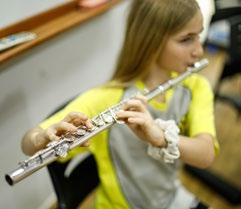
Description
A very popular instrument of the woodwind family and is the highest pitched instrument in the Concert Band. It is suitable for all students as long as they like the high sound produced. As the sound is produced over a tone hole, no problems arise due to braces. Flute players should have a slight “frown” to the upper lip with NO tear drop shape in the middle. Flute tones are produced by being able to focus an extremely small airstream to an exact location on the tone hole. The tear-drop-shaped lip will make it difficult to direct the air precisely. Flute players should also have agile fingers for moving this multi-keyed instrument through a fast musical passage. Students with extreme overbites (receded jaw) should avoid choosing the flute as this makes it difficult to produce quality sounds. Students who excel on the flute can audition to play the oboe, bassoon or piccolo in Year 8 and 9.

The clarinet uses a single reed and a mouthpiece to produce the sound. It has a lower and mellower sound than the flute and is a versatile and rewarding instrument. One necessity of clarinet tone production is the ability to make the chin flat. Orthodontia is okay, but a pronounced underbite may cause sound production problems as it will be hard to place the mouthpiece in the proper position. Students who excel on the clarinet can audition to play the oboe, bassoon, piccolo or bass clarinet in Year 8 and 9.
Saxophone
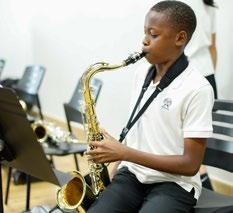
Trumpet
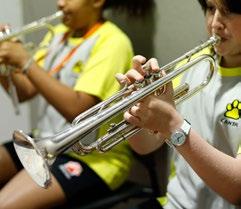
French Horn
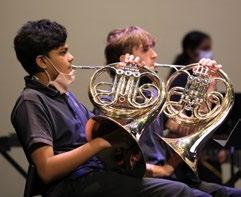
The saxophone uses a single reed and has characteristics similar to a clarinet. However, although it is made of brass instead of wood, it is still considered to be part of the woodwind family; it has a more robust sound than the clarinet and is used in concert, pop and jazz bands alike. Students who excel on the saxophone can audition to play the oboe, bassoon, tenor saxophone or baritone saxophone in Year 8 and 9.
The trumpet is the smallest member of the brass family and produces sounds through lips buzzing on a mouthpiece. The trumpet often acts as a leader in the band, plays the highest brass part and often plays the melodic line. As the mouthpiece is the smallest, students with thick lips sometimes have some difficulty producing a characteristic trumpet sound. While orthodontia is somewhat troublesome to a trumpet player, it is not impossible to make good sounds with braces. A slight overbite is okay, but an underbite can severely hinder progress on the trumpet.
The approach to playing the French horn is similar to that of the trumpet. However, the French horn produces a much warmer and mellow tone; perhaps the most beautiful tone of all brass instruments.
Like the trumpet, players with thinner lips usually have more success with this instrument. Orthodontia can be troublesome for a horn player, but it is not impossible to make good sounds with braces. A slight overbite is okay, but an underbite can severely hinder progress on the horn.
Baritone Horn (Euphonium)
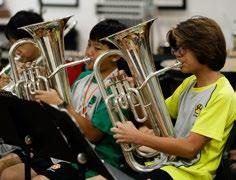
Trombone

Tuba
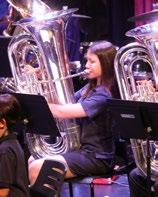
Pitch recognition is very helpful when playing the French horn as it assists beginning players in playing the correct pitches. This instrument is a particularly good choice for motivated and high achieving students who play piano, sing in choir or take voice lessons.
Being part of the brass family and larger than the trumpet, the baritone horn produces a lower, rounder and warmer tone. As the mouthpiece on the baritone is larger than the trumpet and French horn, students with average to thick lips find it easier to produce a full, characteristic sound. The baritone is a good choice for students who like the sound of a brass instrument but will likely have braces.
The trombone is the only instrument in the brass family that uses a slide to play different notes. The mouthpiece and tone produced is very similar to that of the baritone. Furthermore, like the baritone, the trombone is a good choice for students with average to thick lips who will likely have orthodontic work. The trombone is a very flexible instrument and can play in concert band, orchestra and jazz band.
As the lowest pitched brass instrument in the band, the tuba plays the very important role of providing the bass line. The tuba’s role in the concert band is similar to the bass guitar in a rock/pop band. Like the trombone and baritone, fuller lips help produce the low tones necessary. Due to the size of the instrument, students are allocated an instrument to keep at home for daily practice. This eliminates the need to carry a large instrument to school.
Continued over the page
Percussion
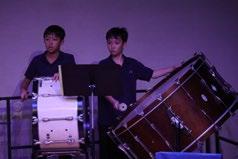
The tuba provides the musical foundation for the band and plays a ‘behind the scenes’ leadership role. This instrument is suitable for a motivated, high achieving student.
The percussion section consists of a snare drum, bass drum, glockenspiel, cymbals, timpani, etc. Percussion provides the rhythmic drive and plays an extremely important role in the ensemble. The percussion section is perhaps the most select, hand-picked section of the band. Students with a background in piano lessons and extremely high gross and fine motor skills will be considered for percussion. An innate sense of rhythm and good hand/eye coordination are desirable.
Initially, string instruments may take a bit more time, but once basic posture and fundamentals are achieved, students can enjoy producing a good sound in a variety of musical styles. String instruments provide students with superb training in both fine and gross motor coordination and ear training. The ensemble experience teaches them to work collaboratively and to listen and learn from one another.
Instrument
Violin
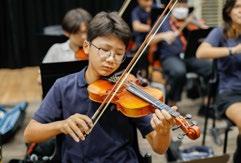
Description
The violin is a very expressive instrument and the backbone of the orchestra. To succeed with the violin, as with any string instrument, good coordination and an ability to match pitch will be important.
Viola
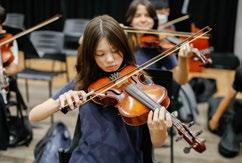
Cello
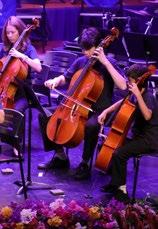
Double Bass
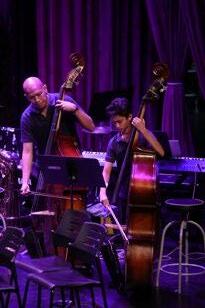
The viola is similar to the violin, but sounds a fifth lower, suiting students who like this more mellow sound. Although full size violas are larger than violins, requiring larger spacing between notes, the school has small violas suitable for students with small hands.
The cello has a wonderful tenor sound, with which many people fall in love! The school has cellos of different sizes to suit student size. Students studying cello will need to bring the instrument to school once a week, on the day of the lesson. Transporting a cello in a school bus is not a problem.
The Double Bass is a big instrument and thus suits students with reasonably good physical strength. It has a wonderful deep and powerful sound, and no ensemble is complete without one. Students studying double bass should not worry about transporting the instrument to and from school as we will provide you with a double bass to keep at home. We have seen very successful double bass players who are quite small, so do not assume you need to be a giant in order to learn this instrument. Apart from the string ensemble, the double bass provides skills which are later useful for Jazz or Pop music.
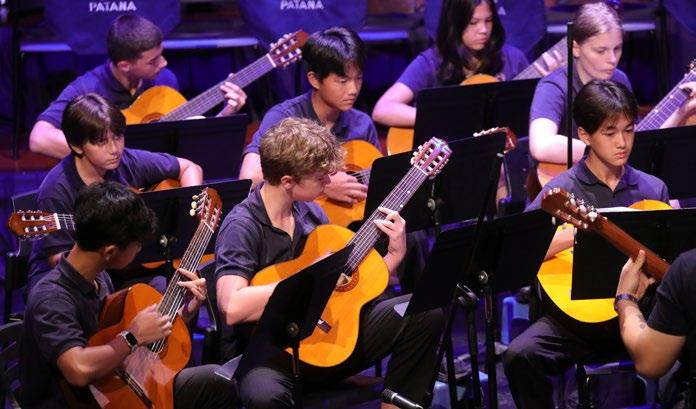
Students need to be good at deciphering notations, as guitar notation is quite complex and polyphonic. Also good coordination in both hands is needed. The course is in classical guitar music, rather than rock or pop - very rewarding when taken seriously. This option is limited to those already playing at an Intermediate level, rather than beginners.
Instrument
Ranard
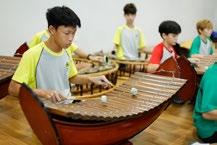
Khim
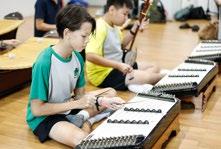
Sor Oo / Duang
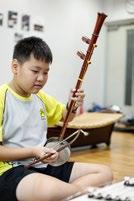

Description
This the Thai xylophone. Most students will already have experience on “Western” xylophones. Suitable for any student, this ensemble includes extension opportunities on other Thai instruments such as the Gong Wong Yay and Lek (Gong circle).
Stringed dulcimer, played with beaters. It is a popular instrument.
Two-stringed instrument played with a bow.
A circle with 18 tuned gongs played with mallets.
